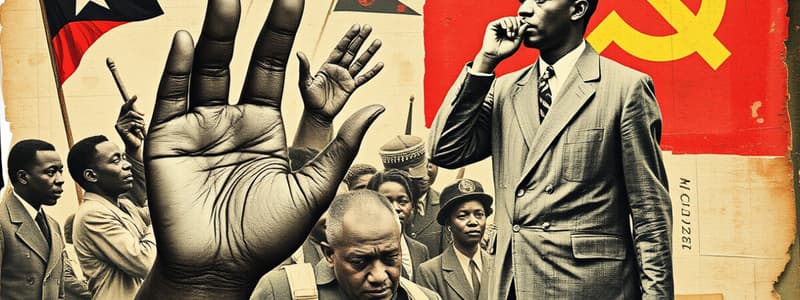Podcast
Questions and Answers
What are 5 major components of class struggle?
What are 5 major components of class struggle?
- Utilizing Marxism for the 'African Revolution' 2) Class struggles and oppressed relationships exist in Africa after colonization 3) Colonization created the African bourgeoisie, who benefitted from Africa's exploitation 4) Colonization created a proletariat & working class exploited by the bourgeoisie 5) Nkrumah says African revolution needs to use a socialist agenda.
What are class struggles?
What are class struggles?
Major issues plaguing African societies a result of colonization, neo-colonialism, and imperialism.
Who is Kwame Nkrumah?
Who is Kwame Nkrumah?
Ghanaian nationalist leader who led Ghana's independence from Britain and was an advocate of Pan-Africanism.
What is capitalism?
What is capitalism?
What is Marxism?
What is Marxism?
What are 5 types of production relationships?
What are 5 types of production relationships?
What is communalism?
What is communalism?
What is feudalism?
What is feudalism?
What is neocolonialism?
What is neocolonialism?
What are 7 things that created class struggle in Africa?
What are 7 things that created class struggle in Africa?
What is a class?
What is a class?
What is the ruling class?
What is the ruling class?
What is the subject class?
What is the subject class?
What is bourgeoisie ideology?
What is bourgeoisie ideology?
What is proletariat ideology?
What is proletariat ideology?
What is elitism?
What is elitism?
What is intelligencia?
What is intelligencia?
What are the 3 sections of intelligencia?
What are the 3 sections of intelligencia?
What role do armed forces & police play in class struggle?
What role do armed forces & police play in class struggle?
What are coups d'etat?
What are coups d'etat?
Who comprises the bourgeoisie?
Who comprises the bourgeoisie?
What are the 3 categories of the bourgeoisie?
What are the 3 categories of the bourgeoisie?
What is the proletariat?
What is the proletariat?
What are the 2 types of proletariat?
What are the 2 types of proletariat?
What constitutes the top tier in African towns/cities?
What constitutes the top tier in African towns/cities?
What constitutes the middle tier in African towns/cities?
What constitutes the middle tier in African towns/cities?
What constitutes the bottom tier in African towns/cities?
What constitutes the bottom tier in African towns/cities?
What are peasants?
What are peasants?
What are the 4 levels of peasants?
What are the 4 levels of peasants?
Flashcards are hidden until you start studying
Study Notes
Class Struggle in Africa
- Class struggle in Africa highlights tensions stemming from colonization, neo-colonialism, and imperialism.
- Key components include the utilization of Marxist theory, the emergence of African bourgeoisie, and the exploitation of proletariat efforts.
- Nkrumah emphasizes the importance of a socialist agenda for the African Revolution.
Kwame Nkrumah
- Ghana's nationalist leader played a crucial role in achieving independence from Britain in 1957.
- Nkrumah studied in the US, where he embraced socialism and pan-Africanism, influenced by Marx, Lenin, and Garvey.
- Instrumental in founding the Organization of African Unity.
Economic Systems
- Capitalism promotes private ownership and operates on profit motives, resulting in unequal classes: the bourgeoisie (haves) and proletariat (have-nots).
- Marxism critiques capitalism, promoting socialist revolutions to dismantle class distinctions.
Production Relationships
- Various production relationships include communalism, slavery, feudalism, capitalism, and socialism.
Neocolonialism
- Refers to the indirect control exerted by former colonizers, where autonomy is superficial, and colonial ideologies persist in the colonized.
Class Structure in Africa
- Emergence of private property relationships during colonization facilitated exploitation through slavery and feudalism.
- Development of a petty bourgeois class among indigenous people, with subsequent generations entrenched in Western ideologies.
Social Classes
- Class groups consist of ruling class (controls economic production), subject class (serves ruling interests), bourgeoisie (elite capitalist class), and proletariat (working class).
Ideologies
- Bourgeoisie ideology supports free enterprise and the protection of private property, while proletariat ideology advocates for socialism and equality.
- Elitism fosters class stratification and perpetuates control by a minority ruling class.
Intelligentsia
- Comprised of educated individuals who navigate colonial frameworks; education increases class division.
- Divided into new privilege classes against socialism, mixed-economy proponents, and revolutionary intellectuals advocating worker-led change.
Armed Forces and Political Power
- Military and police forces largely composed of the educated bourgeoisie serve to protect capital interests and uphold colonial ideologies.
- Coups d'état denote military power grabs, reflecting class desperation and resistance against oppression.
Peasants in Rural Context
- Dispersed, unorganized peasants are foundation to socialist struggles and categorized into levels based on land ownership and socio-economic positions.
- Exploitation is rampant, particularly among those engaged in subsistence farming.
Urban Class Tiers
- Top tier includes bourgeoisie members, military, and professionals; middle tier consists of working-class individuals; bottom tier is made up of marginalized groups like beggars and drifters.
Studying That Suits You
Use AI to generate personalized quizzes and flashcards to suit your learning preferences.




